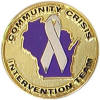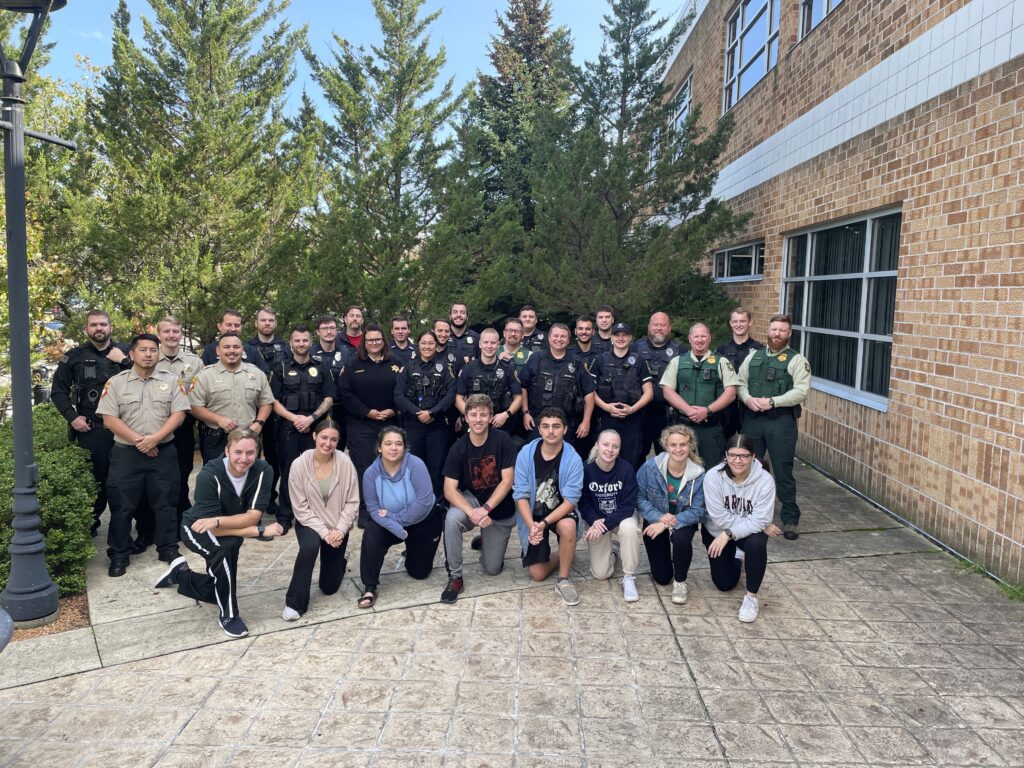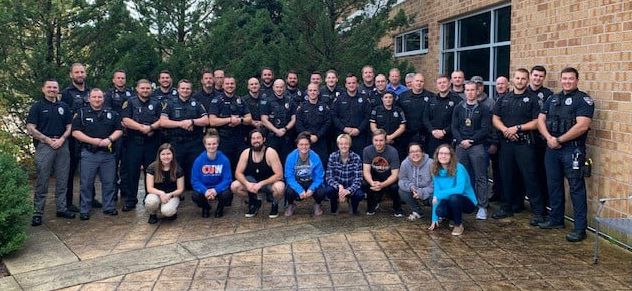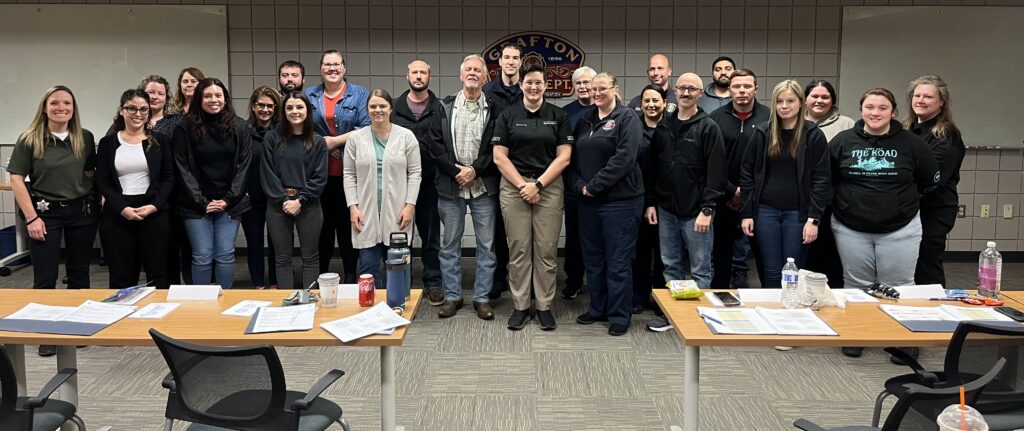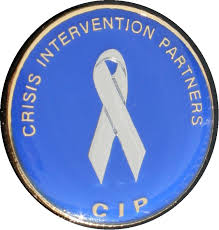Click Here: -> CIT Wisconsin
What is CIT?
CIT (Crisis Intervention Team) programs are local initiatives designed to improve the way law enforcement and the community respond to people experiencing mental health crises. They are built on strong partnerships between law enforcement, mental health provider agencies and individuals and families affected by mental illness.
CIT #16
NAMI Ozaukee CIT #16 held at the Mequon Police Department and CUW on September 25-29, 2023. The training was attended by 25 officers from 14 departments: Ozaukee Sheriff’s Office, Cedarburg PD, Mequon PD, Port Washington PD, Sheboygan Sheriff’s Office, Caledonia FD, Cudahy PD, Fond du Lac PD, Glendale PD, Whitefish Bay PD, Waupun PD, Wisconsin State Capitol PD, and the US Forest Service Department (Michigan).
Front Row: CIT Actors, theater Students from Concordia University of Wisconsin. Four of the student actors are seniors at CUW and will graduate in May 2024; they have participated in CIT training for the past four years; we wish them well in the future.
CIT #13
October 4 through 8, CIT Class #13 was held at the Ozaukee County Fairgrounds with 32 Deputies from the Ozaukee Sheriff’s Office and Police Officers from Grafton, Saukville, Thiensville, Cedarburg, Mequon, Manitowoc, and Hudson Police Departments, as well as Wisconsin State Patrol Troopers. The class was sponsored the Ozaukee Sheriff’s Office, NAMI Ozaukee and Ozaukee Health & Human Services Department.
NAMI Ozaukee Crisis Intervention Partners (CIP)
2023
Session 12
NAMI Ozaukee CIP #12 was held on May 16-17, 2023 at the Grafton Fire Department. Twenty five individuals attended from eight departments: Ozaukee Sheriff’s Office, Grafton/Saukville Fire/EMS, Cedarburg Fire Department, Cudahy Police Department, Greendale Police Department, Kenosha County Sheriff’s Office, UWM Police Department, and Green County Sheriff’s Office. Thank you to the Grafton Fire Department for hosting our training.
Crisis Intervention Team (CIT) Training in Ozaukee County
adopts the “Memphis Model” a Proven Model of CIT
In Law Enforcement, the term Crisis Intervention Team (CIT) refers to a group of highly trained officers who are expected to intervene during an emergency situation involving a person in crisis, who is struggling with some type of mental illness. These officers then respond to the situation and employ techniques learned in prior “crisis intervention training” geared towards de-escalation and successful resolution of the situation.
The techniques and skills they use are likely based around a specific “crisis intervention model” or theories based upon mental health practice and treatment. One well known model used by Law Enforcement is referred to as the “Memphis Model,” which was initially developed in Memphis, Tennessee as a systematic approach to dealing with the mentally ill. It was created through a partnership of Memphis PD officers, the local chapter of NAMI (National Alliance of the Mentally Ill) and the Universities of Memphis and Tennessee.
Together the officers and MH workers were able to coordinate efforts during emergency situations and better handle calls when mental illness was present. This crisis intervention model has been proven to be very effective in building relationships between officers, departments, local mental health, and the community.
Over the past 20 years, significant changes within our mental health system have had far reaching effects. While the movement of persons with mental illness from institutions to the community has been a positive change for most people with psychiatric disabilities, some of the most severely mentally ill have slipped through the cracks.
Left untreated, the sometimes irrational or dangerous behavior engaged by some individuals with mental illness makes it necessary for public safety personnel to respond.
The goal of the Crisis Intervention Team model, described as a best-practice model by the
Police Executive Research Forum, is safety: for the community, the law enforcement officer and the person in crisis.
Not only does the program promote safety for all involved, it also links the person in crisis to services in the community whenever possible.
(Video: MP4 format and approximately 9 minutes in length)
How It Works
- Officers are selected from a list of volunteers from the patrol division and selection is organized to train enough officers to cover each shift.
- Candidates are chosen based on their police skill, compassion, patience and the ability to think creatively.
- Dispatchers, first line supervisors and management personnel should also take the training to ensure continuity and to develop a written CIT policy for their department.
The Training
One forty hour week of training covers:
- Mental illness and substance abuse
- The mental health system
- Safe de-escalation techniques
- Suicide by Cop
- Suicide assessment and prevention
- Children’s mental health and trauma
- Mental health and the law
- Excited delirium
- Real life family and consumer perspectives on living with mental illness
After the basic one-week training:
- Officers are designated to handle all calls involving persons in psychiatric crisis
- Officers receive periodic updates and annual advanced training
Direct Benefits of Police CIT
- Mental health crisis response is immediate
- Consumers are provided care and access to mental health services
- Consumers have enough trust to request CIT officers in a crisis
- Use of force during crisis events will be decreased
- Underserved or ignored consumers are identified by officers
- Mental health consumers will volunteer to serve as integral participants in police training because trust is established
- Mental health professionals will call the police for assistance in a crisis (because they no longer fear the excessive use of force)
- Emergency room doctors seek input from officers on the patient’s level of impulse control and overall dangerousness
- Emergency commitment population will decrease as easier access for mental health services is achieved
- Patient violence and use of restraints in the ER (emergency room) will be reduced due to the intervention of the CIT patrol and de-escalation of potentially volatile situations
- Mental health professionals will volunteer to lend expert instruction/supervision to CIT officers
- Law enforcement officers will be better trained and educated (by using verbal de-escalation techniques)
- There will be less officer injury during crisis events Officer recognition and positive publicity will increase in the community
- Officer “down time” is significantly reduced on a crisis event after being trained as a CIT officer
- Reduction in Cost to communities for emergency detention solution, or criminal justice solutions otherwise opted for because no de-escalation alternatives were available to officers.
(Video MP4 format and approximately 10 Minutes)
Last Updated: January 24, 2022


